文化透视英语unit1
- 格式:doc
- 大小:37.50 KB
- 文档页数:5

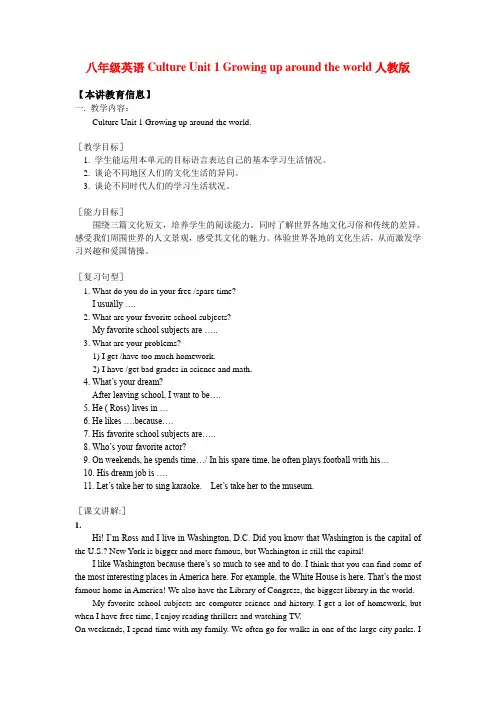
八年级英语Culture Unit 1 Growing up around the world人教版【本讲教育信息】一. 教学内容:Culture Unit 1 Growing up around the world.[教学目标]1. 学生能运用本单元的目标语言表达自己的基本学习生活情况。
2. 谈论不同地区人们的文化生活的异同。
3. 谈论不同时代人们的学习生活状况。
[能力目标]围绕三篇文化短文,培养学生的阅读能力。
同时了解世界各地文化习俗和传统的差异。
感受我们周围世界的人文景观,感受其文化的魅力。
体验世界各地的文化生活,从而激发学习兴趣和爱国情操。
[复习句型]1. What do you do in your free /spare time?I usually ….2. What are your favorite school subjects?My favorite school subjects are …..3. What are your problems?1) I get /have too much homework.2) I have /get bad grades in science and math.4. What’s your dream?After leaving school, I want to be….5. He ( Ross) lives in …6. He likes ….because….7. His favorite school subjects are…..8. Who’s your favorite actor?9. On weekends, he spends time…/ In his spare time, he often plays football with his…10. His dream job is ….11. Let’s take her to sing karaoke. Let’s take her to the museum.[课文讲解:]1.Hi! I’m Ross and I live in Washington, D.C. Did you know that Washington is the capital of the U.S.? New York is bigger and more famous, but Washington is still the capital!I like Washington because there’s so much to see and to do. I t hink that you can find some of the most interesting places in America here. For example, the White House is here. That’s the most famous home in America! We also have the Library of Congress, the biggest library in the world.My favorite school subjects are computer science and history. I get a lot of homework, but when I have free time, I enjoy reading thrillers and watching TV.On weekends, I spend time with my family. We often go for walks in one of the large city parks. Ialso play football with my friends, or we just go to the mall and hang out.When I leave school, I plan to study history. One day, I want to become president and live in the White House!4a.Living in the OutbackNicky Logan is 13 years old, and she comes from the Australian Outback. She lives on a farm with her parents, her brothers Martin and Ben, and 50,000 sheep.The Logan’s farm is in the “outback”. A lot of Australia is “outback”—it’s very hot and dry, and not many people live there. Sometimes Nicky and her family don’t see any other people for weeks.So how do Nicky and her brothers go to school? Well, they don’t go to school — their school comes to them, by radio and the Internet. They sit at home and talk to their teachers and classmates on the radio. Their classmates live on other farms and their teachers work at the “School of the Air”, in a place called Alice Springs. When the pupils have to do homework, they send it to their teachers by fax or the Internet.When Nicky isn’t studying, she likes to ride her horse and help the farm workers with the sheep. It’s hard work for a young girl, but she enjoys it. Sometimes she plays tennis with her brothers, and when it’s very hot, she likes to go swimming in the river on the farm.“I really like living on an outback farm,” says Nicky. “There are some very cool animals like koalas and kangaroos. But not all the animals are cool. There are some dangerous snakes and spiders here. They can be scary!”The “School of the Air” is only for younger students. So next y ear, when Nicky is 14, she has to go to a school in Alice Springs. She is going to live at the school and visit her family during the vacations. “I’m going to miss my parents and my horse,” she says, “but I still want to go. I want to study with other kids for a change.”9a.I had to get up at six o’clock every morning and ride my bike five miles to school. In winter, it was very cold, and in summer it was very hot, but I didn’t mind. I liked to exercise.We wore uniforms to school, not like Canadian kids today. Some of the girls liked their school uniform, but the uniform for boys looked strange. We had to wear ugly straw hats!Our school wasn’t in a very good place. It was next to a train station. Sometimes it was difficult to hear the teacher because of all the trains outside. The school was small, too, and the classrooms were very crowded. There were usually forty or fifty students in every class.There was no TV at that time, so we didn’t know a lot about the world. I remember our geography textbook had beautiful photographs from far away places like India, China, and Africa. Geography was really interesting for kids in those days!Families were poor because it was the time of the Great Depression. I wore my elder brother’s old unifor m. My shoes had holes where you could see my feet. It was terrible!We were poor but we still enjoyed ourselves. I liked to play baseball and ice hockey after class. But we played ice hockey on frozen ponds. Not inside like the kids today.[补充阅读练习]Mind your manners!Around the world, people have different ideas about what good table manners are. In India, for example, people only eat with their right hands. You take food from one dish on the table, usually a kind of bread or rice, mix it with food from another dish and then put it in your mouth. Your left hand stays still. Eating with your left hand is very rude!In western countries, people don’t usually share the same dishes. Everyone has his or her own plate of food. You eat with a knife and fork and you shouldn’t wave them around when you aren’t eating. And you should try not to be noisy when eating. People think that’s bad table manners!When you go to restaurants in different parts of the world, it’s important to know what p eople think is rude. For example, in China it’s OK to be noisy in a restaurant. In fact, if a restaurant isn’t noisy, you may think it’s not very good. However, in many western countries, restaurants are quiet place. If a table is too noisy, other customers might not be happy.Paying for the meal is also different from country to country. In China, one person usually pays for everyone. In western countries, when friends eat together, they usually share the cost. This is called “going Dutch.” Also, when westerners pay the check, they usually leave some money for the waiter. This is called “leaving a tip.” Not leaving a tip is very rude. In the U.S., it’s common to leave tips of 10%, 15%, or 20% of the check. The amount depends on how good the waiter was. Good waiters can get a lot of money!The way people eat food is different around the world, but you can find the same kinds of food in many countries. Chinese and Italian foods, for example, are popular all over the world.【模拟试题】(答题时间:70分钟)一. 对话。
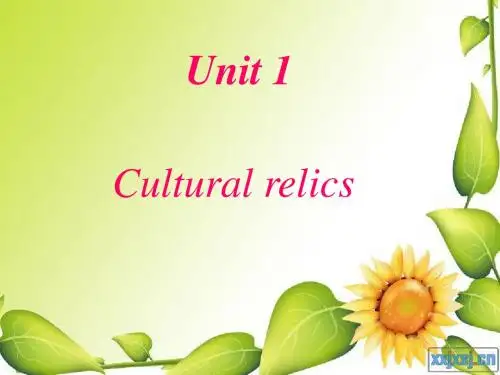
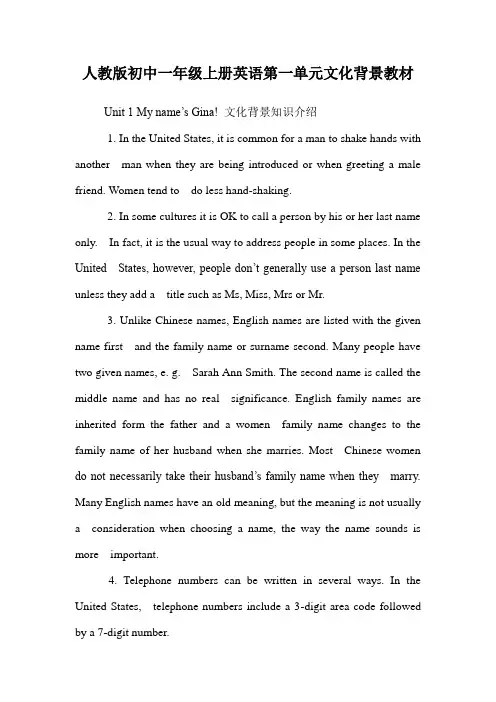
人教版初中一年级上册英语第一单元文化背景教材Unit 1 My name’s Gina! 文化背景知识介绍1. In the United States, it is common for a man to shake hands with another man when they are being introduced or when greeting a male friend. Women tend to do less hand-shaking.2. In some cultures it is OK to call a person by his or her last name only. In fact, it is the usual way to address people in some places. In the United States, however, people don’t generally use a person last name unless they add a title such as Ms, Miss, Mrs or Mr.3. Unlike Chinese names, English names are listed with the given name first and the family name or surname second. Many people have two given names, e. g. Sarah Ann Smith. The second name is called the middle name and has no real significance. English family names are inherited form the father and a women family name changes to the family name of her husband when she marries. Most Chinese women do not necessarily take their husband’s family name when they marry. Many English names have an old meaning, but the meaning is not usually a consideration when choosing a name, the way the name sounds is more important.4. Telephone numbers can be written in several ways. In the United States, telephone numbers include a 3-digit area code followed by a 7-digit number.(760) 431-2022(Area Code) Telephone numberBecause telephone numbers can be difficult to remember, people sometimes break them up when they say them or write them down. It is quite common for people to write a number as 431-2022 rather than 4312022.这一章大部分课文的学习,是对自己的介绍,包括自己的姓名、来自于哪里等。
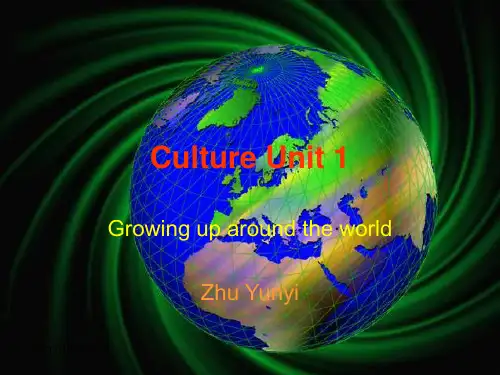
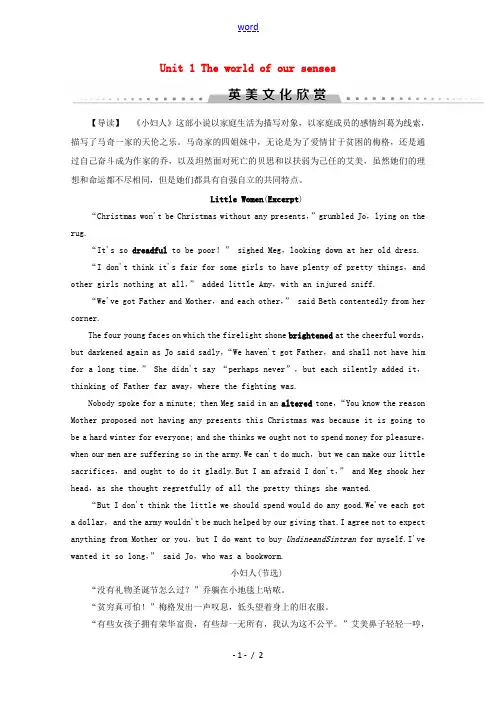
Unit 1 The world of our senses【导读】《小妇人》这部小说以家庭生活为描写对象,以家庭成员的感情纠葛为线索,描写了马奇一家的天伦之乐。
马奇家的四姐妹中,无论是为了爱情甘于贫困的梅格,还是通过自己奋斗成为作家的乔,以及坦然面对死亡的贝思和以扶弱为己任的艾美,虽然她们的理想和命运都不尽相同,但是她们都具有自强自立的共同特点。
Little Women(Excerpt)“Christmas won't be Christmas without any presents,”grumbled Jo,lying on the rug.“It's so dreadful to be poor!” sighed Meg,looking down at her old dress.“I don't think it's fair for some girls to have plenty of pretty things,and other girls nothing at all,” added little Amy,with an injured sniff.“We've got Father and Mother,and each other,” said Beth contentedly from her corner.The four young faces on which the firelight shone brightened at the cheerful words,but darkened again as Jo said sadly,“We haven't got Father,and shall not have him for a long time.” She didn't say “perhaps never”,but each silently added it,thinking of Father far away,where the fighting was.Nobody spoke for a minute; then Meg said in an altered tone,“You know the reason Mother proposed not having any presents this Christmas was because it is going to be a hard winter for everyone; and she thinks we ought not to spend money for pleasure,when our men are suffering so in the army.We can't do much,but we can make our little sacrifices,and ought to do it gladly.But I am afraid I don't,” and Meg shook her head,as she thought regretfully of all the pretty things she wanted.“But I don't think the little we should spend would do any good.We've each got a dollar,and the army wouldn't be much helped by our giving that.I agree not to expect anything from Mother or you,but I do want to buy UndineandSintran for myself.I've wanted it so long,” said Jo,who was a bookworm.小妇人(节选)“没有礼物圣诞节怎么过?”乔躺在小地毯上咕哝。
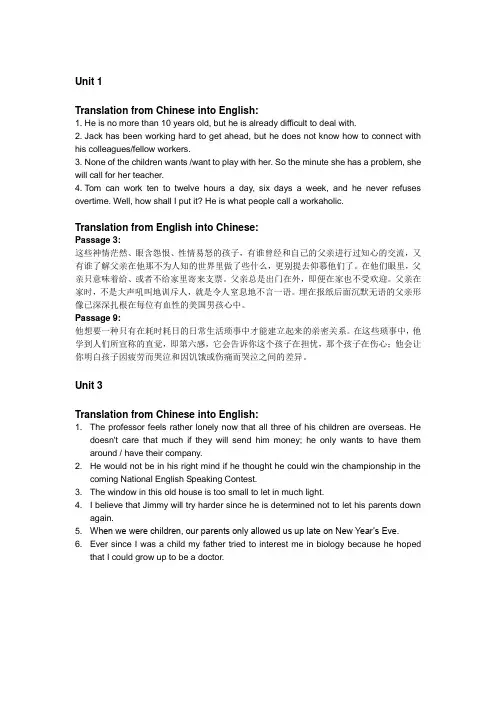
Unit 1Translation from Chinese into English:1. He is no more than 10 years old, but he is already difficult to deal with.2. Jack has been working hard to get ahead, but he does not know how to connect with his colleagues/fellow workers.3. None of the children wants /want to play with her. So the minute she has a problem, she will call for her teacher.4. Tom can work ten to twelve hours a day, six days a week, and he never refuses overtime. Well, how shall I put it? He is what people call a workaholic.Translation from English into Chinese:Passage 3:这些神情茫然、眼含怨恨、性情易怒的孩子,有谁曾经和自己的父亲进行过知心的交流,又有谁了解父亲在他那不为人知的世界里做了些什么,更别提去仰慕他们了。
在他们眼里,父亲只意味着给、或者不给家里寄来支票。
父亲总是出门在外,即便在家也不受欢迎。
父亲在家时,不是大声吼叫地训斥人,就是令人窒息地不言一语。
埋在报纸后面沉默无语的父亲形像已深深扎根在每位有血性的美国男孩心中。
Passage 9:他想要一种只有在耗时耗日的日常生活琐事中才能建立起来的亲密关系。
在这些琐事中,他学到人们所宣称的直觉,即第六感,它会告诉你这个孩子在担忧,那个孩子在伤心;他会让你明白孩子因疲劳而哭泣和因饥饿或伤痛而哭泣之间的差异。

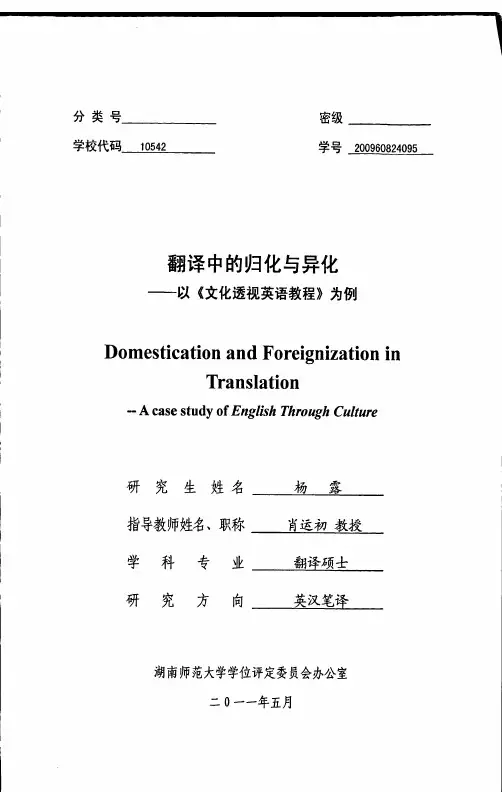
分类号学校代码!鳗鲤密级学号-20-**********翻译中的归化与异化——以《文化透视英语教程》为例DomesticationandForeignizationinrnllranslatlon-·--AcasestudyofEnglishThroughCulture指导教师姓名、职称直鎏塑塾撞湖南师范大学学位评定委员会办公室二0一一年五月’一一一DomesticationandF0relgnlZatlonln,-nlranSIatlon--·-AcasestudyofEnglishThroughCultureA砀esisSubmittedtoForeignStudiesCollegeOfHunanNormalUniversityInPartialFulfillmentoftheRequirementsForTheDegreeofMasterofTranslationandInterpretingByYangLuUndertheSupervisionofProfessorXiaoYunchuChangsha,HunanMay,2011摘要语言是文化的载体,而翻译将两种语言相互转换,传递文化信息,与文化密不可分。
作为文化传递的桥梁,译文既要能被目的语读者接受,又要能传递源语文化。
这种文化的转化引起了归化与异化之争。
在跨文化翻译中,归化与异化各有长短,翻译时应慎重考虑。
归化翻译强调译者应该打破文化间的障碍,避免文化冲突,使译文能被读者接受。
异化翻译强调译文要重现源语语言文化,为读者呈现原汁原味的异域风情和语言风格。
本文主要从三个部分来阐述归化与异化的发展问题:第一部分主要介绍归化和异化问题的由来以及两者的内涵;第二部分主要论述归化和异化在使用时是如何对立统一的;第三部分从翻译实践出发(以英译汉为主),举例说明了归化和异化的具体应用方法;最后得出结论:在跨文化翻译中,归化和异化不是完全对立的,而是相辅相成,相互融合的。
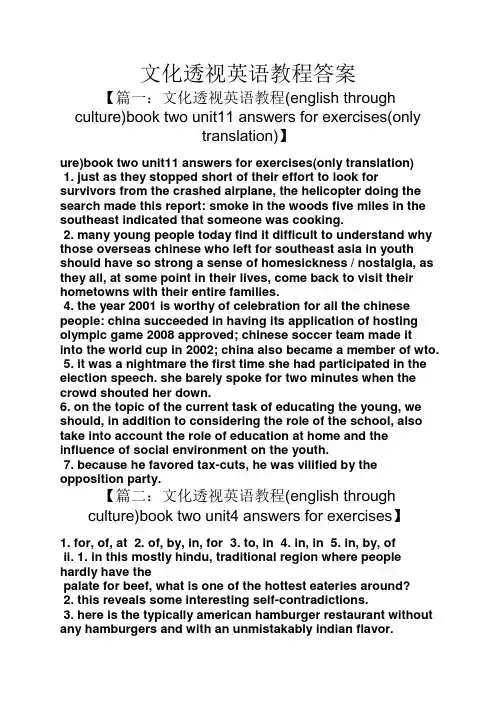
文化透视英语教程答案【篇一:文化透视英语教程(english through culture)book two unit11 answers for exercises(onlytranslation)】ure)book two unit11 answers for exercises(only translation)1. just as they stopped short of their effort to look for survivors from the crashed airplane, the helicopter doing the search made this report: smoke in the woods five miles in the southeast indicated that someone was cooking.2. many young people today find it difficult to understand why those overseas chinese who left for southeast asia in youth should have so strong a sense of homesickness / nostalgia, as they all, at some point in their lives, come back to visit their hometowns with their entire families.4. the year 2001 is worthy of celebration for all the chinese people: china succeeded in having its application of hosting olympic game 2008 approved; chinese soccer team made it into the world cup in 2002; china also became a member of wto.5. it was a nightmare the first time she had participated in the election speech. she barely spoke for two minutes when the crowd shouted her down.6. on the topic of the current task of educating the young, we should, in addition to considering the role of the school, also take into account the role of education at home and the influence of social environment on the youth.7. because he favored tax-cuts, he was vilified by the opposition party.【篇二:文化透视英语教程(english throughculture)book two unit4 answers for exercises】1. for, of, at2. of, by, in, for3. to, in4. in, in5. in, by, ofii. 1. in this mostly hindu, traditional region where people hardly have thepalate for beef, what is one of the hottest eateries around?2. this reveals some interesting self-contradictions.3. here is the typically american hamburger restaurant without any hamburgers and with an unmistakably indian flavor.4. which, it seems, would explain why mcdonald’s can playfully amend its menu, even delete its best-known product and still attract larger crowds of customers.5. in germany, local germans pay ridiculously high prices to satisfy their hunger for big mac.6. the cheeseburger with all its typical ingredients representsa mostbasic eating experience.7. beef has always had a great deal of style.compromise to indian architectural style.9. the 20-year-old corporate sales representative for klm royal dutchairlines, when he came to town, agreed that mcdonald’s offered tasty food and fast service, also with a friendly smile.10. it’s an in-crowd. (diners at mcdonald’s are the cool people) iii. 1. this holds true in beijing as well as in several other major cities inchina.2. a series of talks at the top level will make for better understanding between the two governments.3. by way of answering the question, he began telling a story about his childhood.4. every weekend, he and his girlfriend would be out on the town and have some form of entertainment in the evening.5. many people were upset by edward bond’s dramas which always feature violence.iv. 1. thing, consuming it without questions.2. fashion3. extended4. is the case5. an american image6. represents7. those who know the trend.8. the upper class of the city9. trying to explain his point10. is suggestive ofv.vi.dcdbc dcbbc 1. land came in sight after they had sailed for seven days. they came in sight of the land after a seven-day voyage.make for the improvement of spoken english, though it is not easy to do so / it is easier said than done.3. the success of china in african diplomacy, to some extent, should be attributed to the chinese medical teams. in the mid 70s, there were the same held true (for chinese teams) in the other african countries4. in a sense/ way, the great wall stands for everything that is chinese: its vast and beautiful land, its brave and hard-working people, and its long history. every year the great wall attracts a large number of tourists. many foreign tourists go to the trouble of travelling a long distance to catch a glimpse of it.5. out of respect for the local consumers, the branch of beijing roast duck restaurant in san francisco has tinkered with its traditional menu, but the branch still features roast duck and other items with duck as the ingredient, which nevertheless does not prevent the local consumers chowing down (their meals) here.【篇三:文化透视英语教程(english throughculture)book two unit2answers for exercises】1.at, as;2.behind, at, of;3.in, on, of, in (of);4.of, of, of, in, of, by.ii. 1. cannot be fully investigated, some profound hindsight, agree with;2. representing the sense of relief of, becoming a symbol, to pursue its eurocentric vision of expansion, those who will become american citizens in the future;3. it seems that “freedom” cannot apply to those who are still unfree;4. may not have even understood the irony;5. recorded the moment with this drawing (or we can use yunchao’s version: draw a picture in order to catch (record) the moment);6. turned out to be a hoax;7. conceal/disguise american injustice.iii. 1. support - align itself with2. concerns only - only applies to3. as representatives of - in the name of4. arrested - picked up5. thousands of people fled their homes to a safer place - people fled their homes to a safer place by the thousands.iv. 1. examining layer after layer;2. result directly from;3. is doubly evident;4. horrifying/horrible/terrifying/terrible;5. looking passively/indifferently over;6. was encouraged/aroused by;7. d ecided to be innocent …v. 1-5. bacbc 6-10. adbaavi. 1. when we review the history of the twentieth century, we should thank /be grateful to those photographic journalists. it is they who captured many significant historical moments for us, and some of them even sacrificed/lost their lives for these / in the process.2. he was a suspect after the explosion. one reason was that he could not facts3. the at 11:30 p.m. attracts many audiences. the humorous and witty4.5. who could believe that the president was innocent in this bloody racial riot? when the locals attacked/raided the chinese-owned stores and residences /living places。
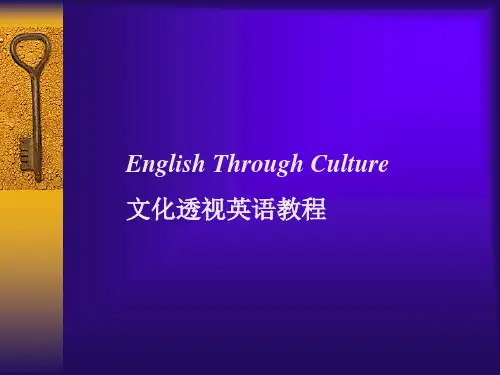
Unit 1I. 1.in; 2.in, into, with; 3.about; 4.in, in; 5.as.II. 1. the word that has been overused too often (much/frequently);2. word whose power has become weaker since it has been misused for a long time;3. I am able to see my mirror image, I say I love;4. It is useless (frustrating) that you come across it;5. Is love without any conditional;6. If rational thought should finally defeat romance, under discussion, disappear;7. is she singing that love is dependent, is love really based on what you need;8. a better (an improved) definition, my ideal is that I can become a better person after I haveknown him;9. gather yourself together (cheer yourself up), swallow the bitter pill, shows up, encouragesyou to try to love again;10. is stereotype, its innate nature cannot be denied;11. get involved in relationships, all of the laughter and the tears makes us to be a betterperson.III.1. do not understand-> are confused about2. children of 3 to 6 years old-> children whose ages range from 3 to 63. met-> ran into4. because they were trying to fight for -> in pursuit of5. finally succeed->win out6. in connection with the issue of -> in terms ofIV.1. seldom, with so much freedom;2. regarded it as completely sacred and pure, only3. varies from, those full of angst4. completely5. conducive to thought6. what happen if, for what I have given7. function / succeed8. originally / from the very beginningV.1-5. badcc 6-10. bcbcaVI. 1. In order to prepare the city for the 2008 Olympic Games, Beijing Municipal Government has adopted a number of measures/steps to improve the air quality. But itis hard to say if any of these will work out/ be effective.2.My good friend Mary said that she wanted to quit / drop out of school. And I asked herto contemplate carefully what effect it would bring to her life.3.In terms of strengthening the cooperation in the international affairs and bilateral trade,the improvement in relationship between China and America is beneficial / conducive / advantageous to both (sides/countries).4.Though the Ministry of Education has cance ll ed the requirement of marital status forthe college examinees, many old people still hold (the view) that a married student cannot concentrate on/attend to/engage in studies5.When she drove for the first time, she was confused about the road signs / guideposts.And she drove off the freeway / highway /expressway several times at the wrong exits.6.When her daughter was murdered, she resigned from her job and traveled to severalprovinces in pursuit of the murderer. Even her marriage failed as a result.7.She has not made much progress in her English pronunciation and intonation. I am notsurprised because she could not speak standard Chinese / mandarin well to begin with.8.Tom was hung / suspended on a small tree on the halfway up the mountain, and thepolice shouted to him to hang on and the helicopter would arrive soon.。
文化透视英语教程(English...文化透视英语教程(English through culture)BOOK TWO Unit7 answers for exercises( only translation)1.As a multi-ethnic region /As a region in which many ethnic groupslive, we must acknowledge the differences between one race and another in terms of ideology, cultural traditions, religious beliefs and customs. Meanwhile, we should be alert to the belief that each race is an independent community whose culture should be pure and not be diluted.2.As soon as new China was founded, it abolished all the unequaltreaties that the old government signed with the imperialist countries, because those treaties were imposed on the old government by the imperialist countries.3.Residents in Shanghai used to look down upon the outsiders. As lotsof outsiders have now settle down in Shanghai to live and work, this situation seldom manifests itself in recent years.4.After several frustrations/failures, he becomes more mature and canput /deal with the relationship with his female friends in perspective.5.He seems an eccentric, because his opinions are always in oppositionto most people’s. And someone says that he cuts himself off from the social consciousness on purpose/deliberately.6.Some students are forced to choose to be English majors, but I am anEnglish major by (my own) choice.7.I am confident to manage the company well, but the condition is that Iwant to run it on my own terms. Furthermore, I should not be responsible for the loss (which is) brought about by the former manager/my predecessor。
Unit 1 Lifestyles英美文化欣赏【导读】《傲慢与偏见》是奥斯丁的代表作。
这部作品以日常生活为素材,一反当时社会上流行的感伤小说的内容和矫揉造作的写作方法,生动地反映了18世纪末到19世纪初处于保守和闭塞状态下的英国乡镇生活和世态人情。
【节选】The Bennets' new neighbourIt is a truth well known to all the world that an unmarried man in possession of a large fortune must be in need of a wife.And when such a man moves into a neighbourhood,even if nothing is known about his feelings or opinions,this truth is so clear to the surrounding families,that they think of him immediately as the future husband of one or other of their daughters.“My dear Mr Bennet,” said Mrs Bennet to her husband one day,“have you heard that someone is going to rent Netherfield Park at last?”“No,Mrs Bennet,I haven't.” said her husband.“Don't you want to know who is renting it?” cried Mrs Benne t impatiently.“You want to tell me,and I don't mind listening.”Mrs Bennet needed no further encouragement.“Well,my dear,I hear that he's a very rich young man from the north of England.It seems he came to see Netherfield on Monday and was so delighted with it that he arranged to rent it at once.Of course,it is the finest house in the area,with the largest gardens.His servants will be here by the end of the week,and he will be arriving soon afterwards!”班纳特家的新邻居家产万贯而又尚未婚配的男人一定需要一个贤内助,这是一条世界上尽人皆知的真理。
Unit1Close readingExercisesⅠ.1.between.2,from,to,of/in.3.from/in ,to,in,with,behind.4.to ,for Ⅱ.1.Who among those fiery sons, with their eyes showing angerand confusion, really communicated with his father?2.Who even knew ,not to say admired, what the father did inhis not-so-well-understood world(or his self-enclosed city)? 3.whether he was considered a father or not depended onwhether or not he could bring home income4.It meant either shouting or that troubling silence most deeplyhidden in the soul of any real American boy5.I wish there were something else in the file folder, some story,some positive example that you could uphold.6.they go through the files on the subject in their minds7.there is even an occasional full-time father-who makes thesame kind of mistakes as full-time mothers would make8.he wants the kind of relationship that is (only) intimatelyinvolved with the family’s daily routines that require time and practiceⅢ.1.He cannot tell the difference between the two sounds, letalone pronounce them accurately.2.The job at the front desk is meant for those who havereceived some basic training in computer and English.3.The minute Mr.goldsmith comes to the office; let him knowthat the boss wishes to see him.4.She loves to go to the class reunion .on the other hand,shedoes not want to see that person who hurt her feelings in the past.5.nobody knows for sure what has happened between Susanand her ex-boyfriend ,but it is clear that she refuses to be involved in anything connected to himⅣ。
1. it’s a simple story about a judge who, when faced with a fifteen –year –old kid who needed help, made an unusual judgment.2. There is an excerpt from a novel by Stephen Koch.3. So these sons are trying to devise their own positive examples for emulation.4. Margaret Mead has written that “human fatherhood is something invented for social purposes”5. These fathers don’t want to be the kind of fathers who only spend time with their families on Sundays.6. They can’t insist on the excuse that the reason they are not there for their families is because they have to work hard to be successful justifying their absence with the need to make it.7. Their bosses are usually men of their father’s generation whose offices are designed for full –time mothers and absent fathers.Ⅴ.1. He is no more than 10 years old, but he is already difficult to deal with.2. Jack has been working hard (in the hope) to get ahead, but he does not know how to connect with his colleagues3. None of the children wants to play with her .so the minute she has a problem, she will call the teacher for help.4.Tom can work ten to twelve hours a day ,six days a week, and he never refuses any opportunity to work overcome ,but –how shall I put it ?he is what people call a workholicFurther reading (passageⅡ)Multiple choice exercises1-d.2-b.3-b.4-b.5-d.6-c.7-a.8-d.9-a.10-bListeningExercises for listening compressionⅠ.1-c, 2-aⅡ.1-T.2-F.3-F.4-TWritingWriting exercises1. every time I visited my hometown, a small village in the mountain area, memories about my happy and carefree childhood would come back to me.2. All that interests me at the moment is whether we should take the trip. All other topics we can discuss later.3. In fact, we found out that the trip was rather costly, not at all like the good deal that the travel agent had promised.4. It is my father who does cooking every day since my mother goes to work on the other side of the city and comes home rather late.Guided writing: summaryⅠ.from the age of five or six Berger began to fear for the death of his parents .the fear would come with nightfall .hewanted to know that his parents would not die at night. but he could not rally ask :you won’t die in the night ,will you ?Instead, he invented the euphemism: see you in the morning !Ⅱ.if my mother was all too thrifty ,she was generous at the dinner table ,offering whatever she had bought ,prepared and cooked to whoever came into the house .she had learned from her childhood that it was hard to survive in life ,she asked no favor of anyone and depended on nobody ,love ,my mother used to say ,is the only thing that counts in the world .。